- Home
- Chris Wraight
The Path of Heaven Page 31
The Path of Heaven Read online
Page 31
This was not the way he had ordered his Legion in the past, but he could already see the reason for it. Though free of the worst aether-sickness on the void station, the Swordstorm was buzzing with a barely suppressed fever, the kind of madness only borne from warp-exposure. The faces of the mortals were scored with it – a haunted look, etched with the deepest species-fear.
‘How close are we to combat?’ the Khan asked his escort, Qasahn, one of Namahi’s warriors.
‘It is already upon us, Khagan,’ came the reply. ‘Tachseer falls back to the fleet, and the enemy comes for us in his wake.’
They entered the bridge antechambers, scaling the winding stairs. The air reverberated from the hard growl of plasma engines at full stretch, orientating the flagship and bringing it into optimal position.
When they reached the command bridge, Jubal was waiting.
‘Welcome back, Khagan,’ he said, bowing, then standing back from the throne.
The Khan made no movement towards it. ‘Tell me.’
‘We reaped a toll as they came through the barrier. We are now in defensive orientation, and all ships stand ready.’
The Khan studied the tactical displays, then looked up and out through the real-view portals. The White Scars fleet had adopted khuree formation – a loose sphere, with the line battleships at the centre surrounded by their flanking escorts. The deployment allowed development of flanks in any direction, responding instantly to the attack pattern of the enemy.
Shiban’s ships were already visible to the naked eye, racing back before they could be overwhelmed. Behind them, as yet only a speckled line of silver against the void, came the pursuing vanguard, burning hard to get into contact, their lances flashing sporadically as they sought their range.
Jubal had pulled a long way clear of the crystal sphere, aiming to give the fleet as much room to manoeuvre as he could, and yet the basic situation was lost on no one – they were hemmed in, with nowhere to run to. The enemy stood between them and the Catullus Mandeville points, and any attempt to break back out of the aether barrier while under fire would be ruinous.
The Khan turned away from the vista. Hundreds of crew worked at their stations, all overseen by Jubal’s warriors. The open spaces before the command throne – wide plazas where normally the keshig would have assembled in defence of their lord – was instead occupied by warriors from many brotherhoods, as yet placed in no order, looking like they had only just arrived.
Ilya stood before them, and she was looking back at him strangely – defiant, and a little nervous.
‘The sagyar mazan, Khagan,’ she said. ‘It was not fitting, for them to rot in the void when there was need for warriors here.’
The Khan ran his gaze across the assortment of warriors. They were equipped in wildly different ways. Some wore their old Legion armour, others had taken battleplate from those they had slain. They carried a motley assortment of weapons – bolters, power weapons, straight blades bearing the marks of other Legions. Those with no helm displayed their heritage proudly – the dark skin of the Chogorian, the more varied of the Terran, all marked with the pale scar on the left cheek.
They, too, were wary. He had passed judgement on them a long time ago. Some of their khans he had executed, others he had exiled and were now dead.
He walked up to them, and they waited in silence, none taking a backward step.
‘This is a place of honour,’ the Khan said. ‘You have been given the chance to earn it again.’
Then he was looking at all of them, at Jubal, at Namahi, at Arvida. The Stormseers had assembled there, as had those of the keshig who were not still on Dark Glass.
‘So the storm breaks, my brothers,’ he said. ‘We will meet it together.’
Down in the depths of the Proudheart, the growing sounds of battle made scarce impact on the humid silence. Von Kalda’s daemonic nursery had been heavily warded, both from the physical and the metaphysical.
Containment vials, dozens of them, ran down along the inside of the summoning chamber’s walls. Each was occupied with a writhing denizen of the warp, thrashing and kicking like a foetus in the womb. Daemon-smoke frosted thickly against the armourglass now, solidifying, curdling before his eyes.
Von Kalda felt the lines of sweat drip from his forehead as he knelt. The rites had been as hard as anything he had ever known, tearing at his soul with every uttered word and drawn symbol. A hundred slaves had been butchered for every neverborn now shivering in the columns of glass and sorcery.
They whispered in broken half-sounds, coming close to full speech again, growing stronger as the flagship powered its way closer to the warp rift. The daemons could sense its proximity, and their bodily strength swelled as the stuff of reality thinned.
Von Kalda rose to his feet, allowing himself a moment for the dizziness to clear. He dropped his sickle to the floor, where it thudded wetly into the sea of viscera slopping across the stone.
Nearly there, said Manushya-Rakshsasi, as ever the foremost of those that he summoned. I can feel the gate.
‘Not… yet,’ panted Von Kalda, knowing that timing was everything. They needed mortal souls, vectors for instantiation, and the rites had not been completed. ‘Observe.’
He staggered over to a huge altar set into the chamber’s walls, a fusion of bioforms and Unity-era technomancy. He placed his palm against a receiving plate, and columns burst into blood-red illumination.
Between them, five metres up into the cloudy smog of the birthing chamber, hololith images spun into existence. Translucent ship-outlines danced about an axis, swimming in and out of close-focus.
‘Vessels,’ Von Kalda announced. ‘Objects of your instantiation.’
Three clusters of shipping could be made out – the main formation of White Scars battleships, the smaller raiding party the Proudheart was currently pursuing, and the greater mass of Death Guard and Emperor’s Children signals. Von Kalda manipulated the scope of the hololith, zooming close to the rear of the retreating V Legion vanguard. Three ships came into sharp relief – the Kaljian, Ravisher and Suzerain.
Manushya-Rakshsasi studied the lithocast eagerly, its almond eyes narrowing to peer through the swirls within its cage. Prey.
‘You desired a name. I have marked this soul for you.’
And he is already mighty.
The Suzerain was close to its quarry now, shadowed by the larger Ravisher. Von Kalda noted just how close Konenos was keeping, barely maintaining enough space between him and Cario’s ship to keep the void shields from interacting. It was clear what was happening – the prefector had got close enough to launch boarding torpedoes, and was already raking the fleeing White Scars frigate. The hololith showed the impacts, trembling each time a projectile collided with the Kaljian’s shielding.
‘This will be his apotheosis,’ said Von Kalda, beginning to smile. ‘He does not yet see the full potential of the Legion, but you will instruct him well, I am sure.’
The Suzerain was closer now, pulling in hard on the stern of the slowing Kaljian. The chase was almost at its end.
‘They have caught the savages,’ breathed Von Kalda, sensing the moment come upon him. The embryonic presences thrashed in their containment shells now, readying for the hex to carry them out and into the true world of matter, and he turned to the daemon in triumph. ‘Now watch the slaughter.’
You dismiss your enemies too soon.
Von Kalda looked back at the hololith, and saw the truth of it. The White Scars frigate had not slowed because it was damaged – it had slowed to discharge boarding torpedoes of its own. The crew of the Kaljian had expended every last morsel of power to gain a breach in the Suzerain’s forward void shield array, then sent their warriors hurtling back through the void to take on their hunters.
Manushya-Rakshsasi seemed greatly amused by this. That is good. That is brave.
Von K
alda rushed back over to the pentagram where he had enacted the rituals, breaking the hololiths as he barged through them. ‘This complicates things.’
Warp light began to spin and scamper up the walls, stirring the pools of blood and making them simmer. The embryos hissed, sensing the change in the air. Von Kalda unlocked the last of his runes of power, and the lines of blood across the glass cylinders seethed and spat, evaporating into nothingness, releasing the seals and cutting the shackles that separated the worlds.
‘I will give you the names,’ he said.
We have the names.
This time more than one voice answered him – a whole choir of them, crystallising out of the aether, their eyes glimmering with refracted other-light. Whipcords, barbed and bloody, scraped across the containment glass, and cloven hooves stamped down amid the dissipating smoke.
A crack sang out across the chamber, resounding from the low ceiling and making the blood-pools ripple. As one, the embryonic daemons launched themselves upwards, swimming like fish in their tanks, their long sinuous bodies snapping in sine waves.
‘Not yet!’ Von Kalda blurted, stepping clear of the pentagram’s protection, trying to call them back. They did not have the soul-patterns, the true names of the sacrificial victims – all they had was the hololiths, the evidence of their addled, matter-blind senses.
But it was too late. Manushya-Rakshsasi was the first to break the fetters, its containment shell bursting into blinding light, making the armourglass flex and crack. The others followed, shrieking in delight, dragged into full corporeality by the agonies inflicted in their name.
Von Kalda ran up to the birthing columns, pressing himself against the shielding. Within them, the spaces were empty, with just curls of dirty smoke slowly falling back to the ground. He looked back, helplessly, to where the hololiths still played out the void-borne drama and tried to ascertain what the daemons had seen, and where they had gone.
Then his eyes alighted on the central warship, the one that had drifted into the heart of the lithocast’s roving eye.
‘Oh,’ he breathed weakly, slumping back against the glass. ‘Oh, no.’
The Ravisher roared up in the Suzerain’s wake, firing in support at the listing profile of the Kaljian. The void beyond was thick with the star-bursts of munitions and las-fire, crammed with the interweaving paths of hunter and hunted.
Konenos watched from the bridge as Cario’s vessel maintained its harrowing assault, pumping volley after volley of ordnance into the Kaljian’s retreating stern.
‘He really is angry,’ Konenos observed, voice thick through the vox-augmitters in his helm.
‘Remain in close contact?’ Erato asked, tentatively. It was not quite suicidal to stay in such narrow proximity to the thundering starships, but there was little advantage to be gained either.
‘Oh yes,’ Konenos replied, taking up his power sword. The blade was already humming angrily, vibrating in his grip. ‘When Von Kalda gives the command, I wish to be within sight of it. They will be ours to leash – greater weapons than we have ever known, and bound by our words of command.’
The Ravisher loosed a full barrage then, denting its onwards progress by only a fraction but nearly annihilating the Kaljian’s rearward shield overlays. Below Konenos, down in the terraces beneath his throne, a hundred of Eidolon’s Kakophoni waited with barely contained impatience, their armour donned, their psychosonic organ guns whirring in pre-combat build-up. Once the frigate was breached and open, they would be swiftly into the hull, chasing down Cario’s fanatics to witness the change overtake them.
‘They have launched boarding torpedoes,’ said Erato, as if surprised.
‘Good,’ replied Konenos, barely listening, thinking of the slaughter to come in the narrow corridors.
‘No, not the Suzerain,’ said Erato. ‘Its prey.’
Konenos reached out for a tactical lens and hauled it closer. The Kaljian had indeed loosed its own brace of torpedoes, which were whistling through an incoming barrage of las-beams to slam into the prow of the Suzerain.
He was about to remark on the daring of that, but found that his voice had suddenly stopped working. He tried to speak again, to force out the words, and nothing came. Frustration rising, he turned back to the Kakophoni. All of them were silent too, struggling, reaching up for their vox-grilles and banging the mechanisms.
Erato stared back at them, unsure if a reply had been forthcoming. ‘My lord?’
Something very strange was happening. The vox-scream organs in Konenos’ throat contracted, sending out a spasm of noise that smashed every lens within ten metres of him. Mortal menials, even those desensitised to extremes, dropped to the floor, their sutured ears bleeding.
Konenos tried to cry out, but his body was no longer obeying his commands. The atmosphere on the bridge ramped up sharply, becoming humid and cloying. Screams broke out, but they were not from mortal lips. Sensor stations blew and more of the crystal lenses shattered.
By then Erato was shouting something, calling for support, backing away from the Kakophoni. Konenos could barely see a thing, his vision polluted by a blur of raw violet that spilled into his eyes like dye. His hearts went into overdrive, thumping and racing as if they would break out of his straining ribcage.
He staggered backwards, feeling his armour-plates swell and crack. A voice, at first soft, but then rising rapidly in pitch, breathed softly inside his head.
I had you marked from the start, it hissed. So many gifts, so much to play with.
Konenos tried to roar out in defiance, to marshal something with which to counter the consciousness that now crowded out his own, bloating like a tumour within his psyche and driving all out save its own madness.
The Kakophoni were on their knees now, their breastplates bursting, sending ceramite chunks clattering across the deck. The Ravisher’s mortal crew had taken up weapons and were beginning to use them, but that only hastened the pace of transformation.
Konenos cried out in agony, but no sound emerged. The daemon-soul seared into life, shoving the last of the orchestrator’s physical self into oblivion. His outer battleplate exploded outwards, revealing a new, sinuous under-body of violet flesh and black veins. His stature swelled to obscene proportions, until he towered over those around him. Arms, four of them, corded and bound with leather, unravelled in place of his own, and horns erupted, twisting, from the bones of his dissolving face. He took a first step, and instead of a heavy-tread boot, a cloven hoof cracked the decking.
He opened his lungs, and a withering hyper-scream radiated across the bridge, scything through the solid metal around them, powderising rockcrete columns and sending wide crevasses zigzagging across the tilting decks.
All the Kakophoni were the same – expanding, growing, bursting out like parasites from the flaccid bodies of their hosts. They strutted on reverse-jointed legs, crouching obscenely, their long tongues flickering around slender, tooth-filled mouths.
The creature that had once been Konenos, but was now Manushya-Rakshsasi, threw its arms back, shedding the final scraps of armour, and howled in triumph. A long sword curled into being, which it gripped fast. The rest of the daemon-army shrieked back in answer, as graceful, bewitching and lissom as they had once been ponderous. Their eyes flashed with distilled malice, while their voices were unbearable to behold – like the death-screams of entire worlds, rendered down to a single, terrible point of maddening intensity.
Erato backed away, training his bolter on his erstwhile master, firing with typical precision. The shells punched into Manushya-Rakshsasi’s exposed flesh, driving in deep and fountaining black blood. The daemon cried out in ecstasy, its pleasure-cries making the lumens shatter and showering it with multi-faceted crystal. It lashed out with its claws, seizing Erato by the neck.
‘Brave child,’ said Manushya-Rakshsasi, and squeezed.
Erato’s neck crushed, t
he daemon discarded the limp body with a wet thunk.
All across the bridge, daemon-progeny were now let loose. Some capered across the decks, moving faster than any mortal ever moved, their jaws already moist with the hot blood of those in their path. Others rose up like savage angels, their lithe outlines blazing with coronas of lilac, holding the ripped spines of the slain in their claws as trophies. There was no resisting them – their augmented cries shrove the very atoms around them, splitting flesh and withering matter. They fanned out, smashing their way through terraces and delving deep into the servitor-pits.
Manushya-Rakshsasi watched it all unfold, a benevolent smile on its warped, terrible face. Twin claws, borne by its secondary arms, rose high above its tapered skull. Somewhere deep inside it, the one called Azael Konenos was bellowing in mute agony, his soul slowly pulled apart.
‘The portal opens,’ Manushya-Rakshsasi said, delighting in the echoing sound of its own voice.
Real space itself was coming apart, and the mortals were too slow-sensed to see it. The boundaries that kept the two worlds divided had been eroded, then broken, now bent back on themselves. And in the heart of the tempest were the storm-mages, mortals who dared to summon the elements of the aether to themselves. They were the choicest meats, the sweetened morsels that made eternity bearable.
‘Now deliver me the ship, so we may carry ourselves closer,’ Manushya-Rakshsasi commanded, feeling its body swell further, grow further, taller and taller, until it dominated the bloody charnel house of the Ravisher’s bridge. ‘Then we feast.’
Yesugei halted only once before taking Achelieux’s place. He could sense the phenomenal power in the soul-engine, spilling out into the world of the senses like radiation from a reactor. The harmonics shuddered through him, snagging at his very existence, heedless of his physical armour and barely hindered by his psychic mastery.

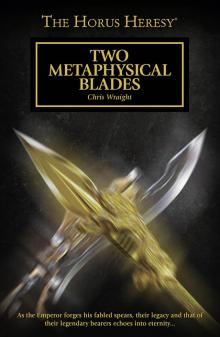 Two Metaphysical Blades
Two Metaphysical Blades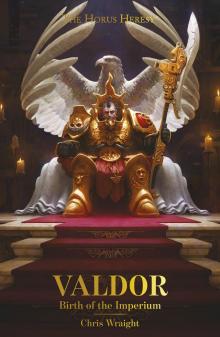 Valdor: Birth of the Imperium
Valdor: Birth of the Imperium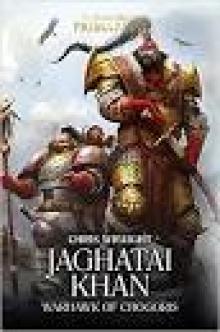 JAGHATAI KHAN WARHAWK OF CHOGORIS
JAGHATAI KHAN WARHAWK OF CHOGORIS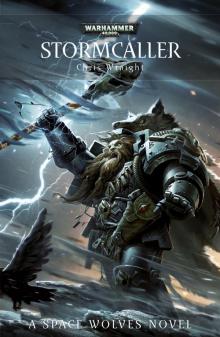 Stormcaller
Stormcaller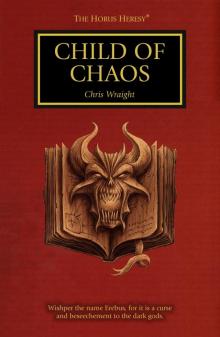 Child of Chaos
Child of Chaos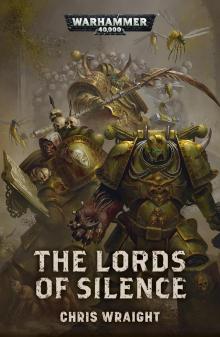 The Lords of Silence
The Lords of Silence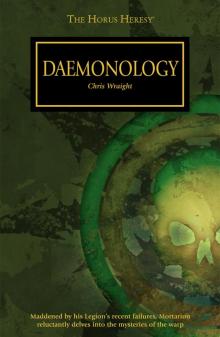 Daemonology
Daemonology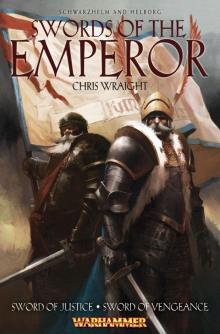 Swords of the Emperor
Swords of the Emperor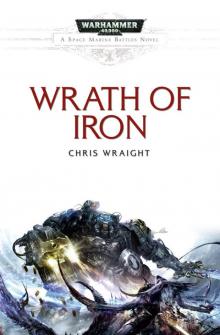 Wrath of Iron
Wrath of Iron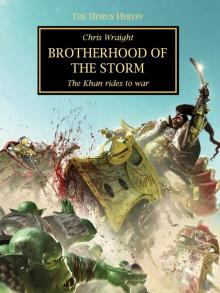 Brothers of the Storm
Brothers of the Storm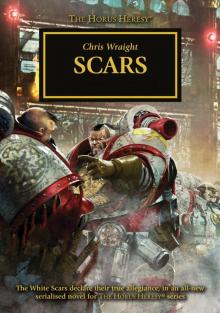 Horus Heresy: Scars
Horus Heresy: Scars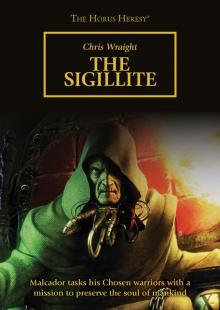 The Sigillite
The Sigillite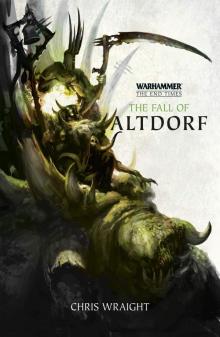 The End Times | The Fall of Altdorf
The End Times | The Fall of Altdorf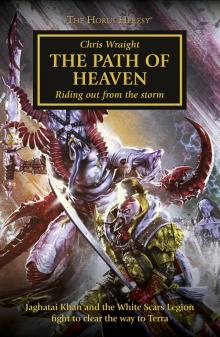 The Path of Heaven
The Path of Heaven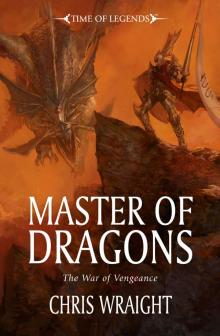 Master of Dragons
Master of Dragons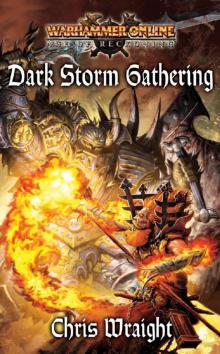 WH-Warhammer Online-Age of Reckoning 02(R)-Dark Storm Gathering
WH-Warhammer Online-Age of Reckoning 02(R)-Dark Storm Gathering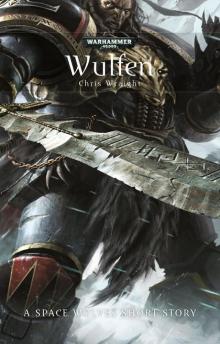 Wulfen
Wulfen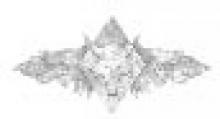 Battle Of The Fang
Battle Of The Fang Onyx
Onyx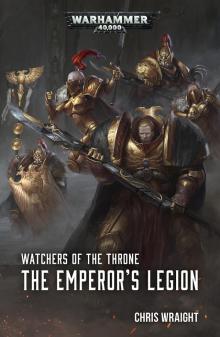 Watchers of the Throne: The Emperor’s Legion
Watchers of the Throne: The Emperor’s Legion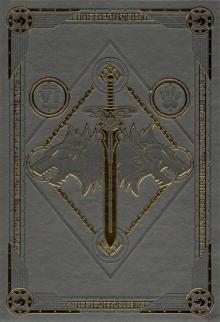 Leman Russ: The Great Wolf
Leman Russ: The Great Wolf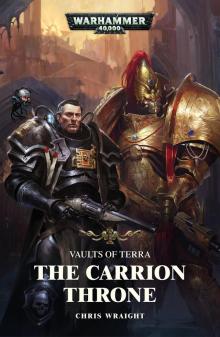 Vaults of Terra: The Carrion Throne
Vaults of Terra: The Carrion Throne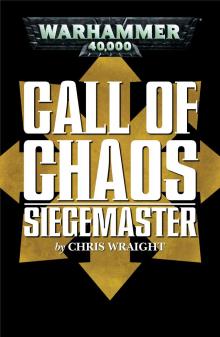 Siegemaster
Siegemaster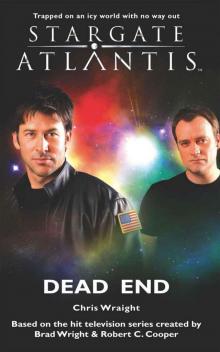 STARGATE ATLANTIS: Dead End
STARGATE ATLANTIS: Dead End Scars
Scars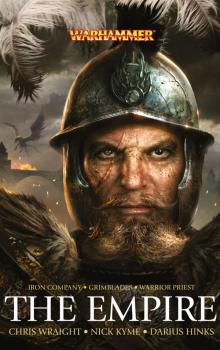 The Empire Omnibus
The Empire Omnibus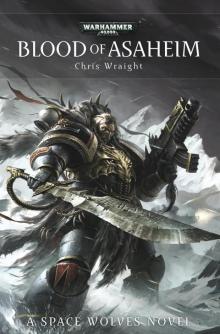 Blood of Asaheim
Blood of Asaheim